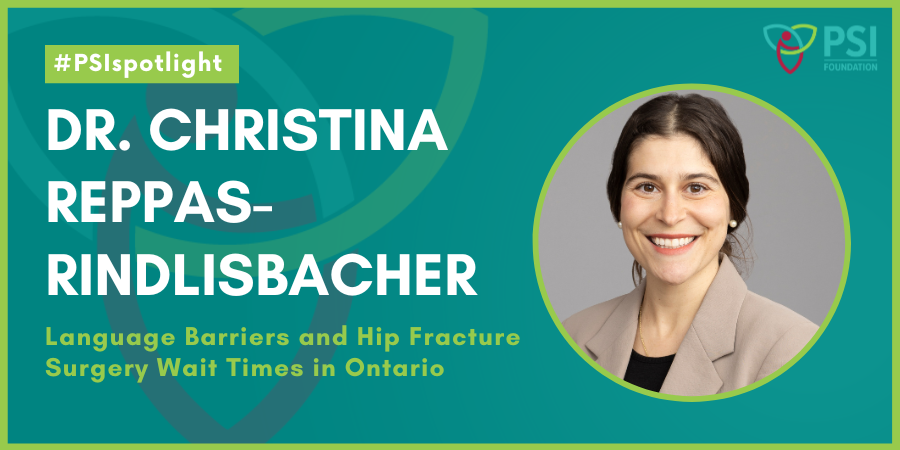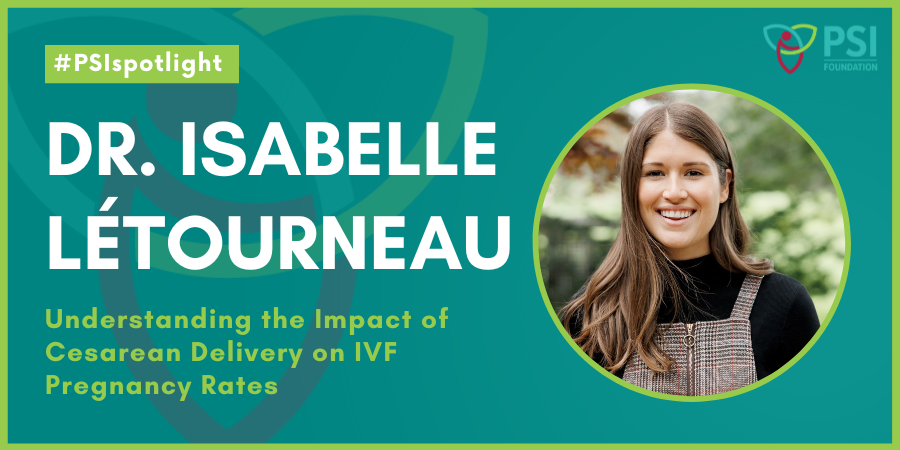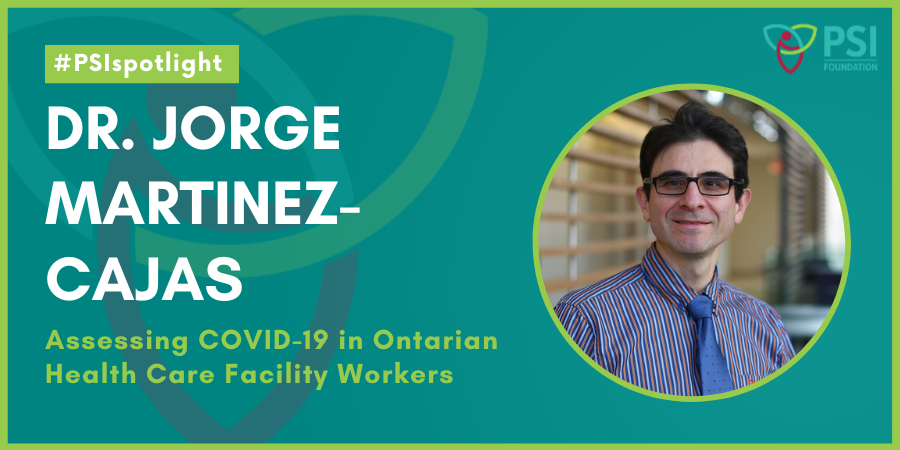“The PSI Resident Research award enabled me to engage in high impact academic research during my residency — allowing me to explore how older adults from minority language groups experience different outcomes after hip fracture surgery.” –Dr. Christina Reppas-Rindlisbacher
About Dr. Christina Reppas-Rindlisbacher
Dr. Christina Reppas-Rindlisbacher is a Research Fellow at Women’s College Research Institute, and pursuing Geriatric Medicine at the University of Toronto. Currently, she is completing a PhD in Clinical Epidemiology & Health Care Research at the Institute of Health Policy, Management and Evaluation (IHPME). She received her medical degree from the University of Toronto, then completed her Internal Medicine residency at McMaster University.
Dr. Reppas-Rindlisbacher’s research interests includes uses of large administrative databases to study practice patterns and long-term adverse outcomes after delirium, with a focus on addressing the unmet needs of older adults who have immigrated to Canada or who have a preferred language other than English. Her work is supported by the University of Toronto Department of Medicine’s Eliot Phillipson Clinician-Scientist Training Program, and the CIHR Canadian Graduate Scholarships Masters Program award. Clinically, Dr. Reppas-Rindlisbacher focuses on acute geriatrics and attends on both the inpatient Geriatric Medicine Consultation Service and the Internal Medicine Clinical Teaching Units.
About the Funded Study
Hip fracture repair is the most common urgent surgery among older adults, making up more than 13,000 hospital admissions in Ontario each year. Hip fractures are often a catastrophic event associated with loss of independence and disability. As a result, hip fractures have been identified as a priority area for health quality improvement. Delays in surgeries to treat this are linked to increased complications, and even death–making timely access a provincial priority.
While longer waits are often associated with delays in diagnosis, consent, or administrative processes, Dr. Reppas-Rindlisbacher suspected another factor: language differences between patients and the healthcare system. Previous studies show that patients who speak a non-English language in predominantly English-speaking settings face more medical errors and receive lower quality of care.
With her PSI-funded study, Resident Researcher Dr. Reppas-Rindlisbacher, under the supervision of Dr. Paula Rochon, set out to explore how language barriers may contribute to longer wait times for hip fracture surgery. Their study, Association between language proficiency and wait time for hip fracture surgery in Ontario: a population-based study, addresses this gap by examining the impact of language preference on surgical wait times and care outcomes.
The study investigated whether non-English language preference affected time to surgery, as well as complications after the operation and discharge destination. Their findings revealed that older adults with a non-English language preference experienced longer waits and were at higher risk of delirium, myocardial infarction, prolonged hospital stays, and more often discharged to a nursing home post-surgery. These results are the first to show inequities in hip fracture care and treatment relating to language differences.
“It is crucial that older patients who speak non-English languages have the same opportunity for functional recovery and discharge home after hip fracture,” says Dr. Reppas-Rindlisbacher.
Impact of the Funded Study
The study’s findings and results highlight the disproportionate burden of harm faced by patients who do not speak or struggle to speak English. “Our findings are a call to action for hospitals to develop standards for language accessible care,” says Dr. Reppas-Rindlisbacher.
Moving forward, she identified steps that would improve care for hip fracture patients. This includes collecting patient language preference data; flagging those who require interpretation; training staff in the effective use of interpretation services; and expanding access to professional interpreters via video, phone, or in-person support.
Their research has already made a significant impact, including major accomplishments such as an oral abstract presentation at the American Geriatrics Society Annual Scientific Meeting, an Op-Ed in Healthing titled “Opinion: The language you speak shouldn’t impact the healthcare you receive,” and publication in JAMA Network Open.
Beyond publications and presentations, the study contributes to a growing body of evidence incentivizing hospitals to invest in interpretation services. It also lays the foundation for quality improvement initiatives aimed at reducing preventable complications and ensuring equitable recovery for patients from linguistically diverse backgrounds.
Looking ahead, the research team plans additional peer-reviewed publications, national and international conference presentations with complimentary Op-Eds. In addition, they aim to achieve knowledge translation through traditional media, social platforms, and collaborations with organizations like RTOERO–helping to share these findings with more than 81,000 members across Canada who may be directly impacted by hip fracture or language-differing care.
“The PSI Resident Research award enabled me to engage in high-impact academic research during my residency–allowing me to explore how older adults from minority language groups experience different outcomes after hip fracture surgery,” says Dr. Reppas-Rindlisbacher. “This project led to collaborations, conference presentations, and a high-impact publication in JAMA Network Open–all milestones that have shaped my career as a future geriatrician clinician scientist.”




